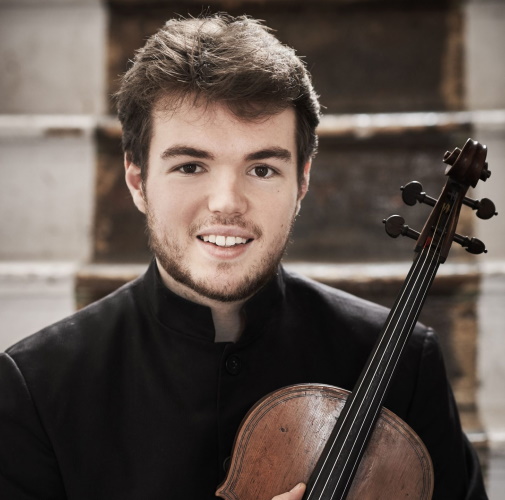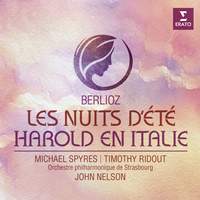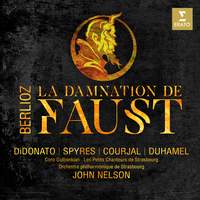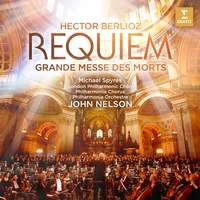Recording of the Week,
Berlioz's Les nuits d'été & Harold en Italie from John Nelson in Strasbourg
John Nelson conducting Berlioz is always a winning combination – quite literally so in the case of his 2017 recording of the composer’s masterpiece Les Troyens from Strasbourg, which quickly became so festooned with accolades that it prompted us to rethink the layout of awards flags on our product-pages…Having fallen under the composer’s potent spell half a century ago, there’s something about the genial American’s affectionate but refreshingly clear-eyed approach to this music that often wins over those who generally find it febrile, overheated and overstuffed – and today’s new recording of the song-cycle Les nuits d’été and the genre-defying Harold en Italie proves no exception.
 Nelson’s soloist for Les nuits is his compatriot Michael Spyres, whose tireless ardour in the punishing role of Enée was one of the glories of that Troyens recording; the two teamed up again a couple of years later for a no less impressive Damnation de Faust, and Spyres’s superb command of the French language and extraordinary palette of vocal colours once more work their magic here in the six settings of poems by Théophile Gautier which Berlioz originally set for voice and piano in 1841.
Nelson’s soloist for Les nuits is his compatriot Michael Spyres, whose tireless ardour in the punishing role of Enée was one of the glories of that Troyens recording; the two teamed up again a couple of years later for a no less impressive Damnation de Faust, and Spyres’s superb command of the French language and extraordinary palette of vocal colours once more work their magic here in the six settings of poems by Théophile Gautier which Berlioz originally set for voice and piano in 1841.
With the notable exception of French baritone Stéphane Degout’s fine 2019 recording with Les Siècles, the cycle has generally been the province of female singers - but there’s an additional twist here in that Spyres tackles the songs in their original orchestral keys. Having initially conceived the set for mezzo/tenor and piano, the composer transposed the second and third songs downwards when he came to orchestrate them in 1856, envisaging that the cycle would be shared by multiple singers: in practice, almost every orchestral recording in the catalogue restores things to factory-settings to allow a single voice to comfortably take on the lot.
Spyres, though, is in a category of his own: this live recording was made just a few weeks after the release of his Gramophone Award-winning Baritenor (which saw him moving effortlessly from high-wire Donizetti to full-fat Verdi and verismo baritone roles), and here again his vocal shape-shifting is something to marvel at. In the opening ‘Villanelle’, he sounds every inch the classic French lyric tenor, but the transition into baritone mode for the radiant ‘Spectre de la Rose’ is so convincing that you’d be forgiven for thinking a second singer had taken the reins. The ensuing Sur les lagunes is even more disconcerting: even low voices occasionally duck the exposed bottom F flat here in favour of a higher ossia, but Spyres takes it entirely in his stride.
 And Nelson’s trademark clarity and fidelity to Berlioz’s markings pay dividends throughout: the ‘Villanelle’ is taken at an unusually sedate pace which respects the original metronome-marking, and the many moments where the scoring is pared down to a minimum (try the magical voice/clarinet doubling at the end of ‘Spectre de la Rose’) really do feel like chamber-music.
That same approach also works quite wonderfully in the Byron-inspired Harold en Italie (Nelson’s first recording of the work), where the young viola-player Timothy Ridout always feels fully integrated into the bigger picture – Paganini notoriously rejected the piece for being insufficiently showy, but no such sense of ego manifests in Ridout’s playing.
And Nelson’s trademark clarity and fidelity to Berlioz’s markings pay dividends throughout: the ‘Villanelle’ is taken at an unusually sedate pace which respects the original metronome-marking, and the many moments where the scoring is pared down to a minimum (try the magical voice/clarinet doubling at the end of ‘Spectre de la Rose’) really do feel like chamber-music.
That same approach also works quite wonderfully in the Byron-inspired Harold en Italie (Nelson’s first recording of the work), where the young viola-player Timothy Ridout always feels fully integrated into the bigger picture – Paganini notoriously rejected the piece for being insufficiently showy, but no such sense of ego manifests in Ridout’s playing.
Certainly he brings plenty of spirit and dash to the more swashbuckling passages – his warm, ringing tone in the upper register is a particular joy - but some of the loveliest moments come when he takes a back seat and accompanies his orchestral colleagues, for instance in the lithe arpeggiated figures of the ‘Marche des pèlerins’. (Reviews of the live concert indicate that Ridout quite literally stepped aside at appropriate points, standing front-and-centre only for the explicitly soloistic passages, and that’s captured beautifully by the sound-engineers on the recording).
A marvellous addition, then, to Nelson’s distinguished Berlioz discography on both counts – and, as far as I’m aware, a genuinely unique opportunity to hear the orchestral version of Les nuits just as the composer intended.
A note for our local audiences in Warwickshire: next Thursday, John Nelson will conduct Handel’s Messiah with The English Concert (and a line-up of soloists including Michael Spyres) at Coventry Cathedral, incorporating all seven of the versions which Handel composed. For those of you further afield, the performance will be live-streamed on medici.tv and an audio recording released by Warner Classics next year.
Read our quick Q&A with John about both projects here.
Michael Spyres (baritenor), Timothy Ridout (viola), Orchestre philharmonique de Strasbourg, John Nelson
Available Formats: CD, MP3, FLAC, Hi-Res FLAC
Joyce DiDonato (Didon), Michael Spyres (Énée), Marie-Nicole Lemieux (Cassandre), Stéphane Degout (Chorèbe)
Orchestre et Choeur philharmonique de Strasbourg, Badischer Staatsopernchor, Choeur de l’Opéra du Rhin, John Nelson
Available Formats: MP3, FLAC, Hi-Res FLAC
Michael Spyres (Faust), Joyce DiDonato (Marguerite), Nicolas Courjal (Méphistophélès), Alexandre Duhamel (Brander)
Orchestre philharmonique de Strasbourg, Coro Gulbenkian, John Nelson
Available Formats: 2 CDs + DVD Video, MP3, FLAC, Hi-Res FLAC
Michael Spyres (tenor), Philharmonia Orchestra, London Philharmonic Choir, Philharmonia Chorus, John Nelson
Available Formats: MP3, FLAC, Hi-Res FLAC






